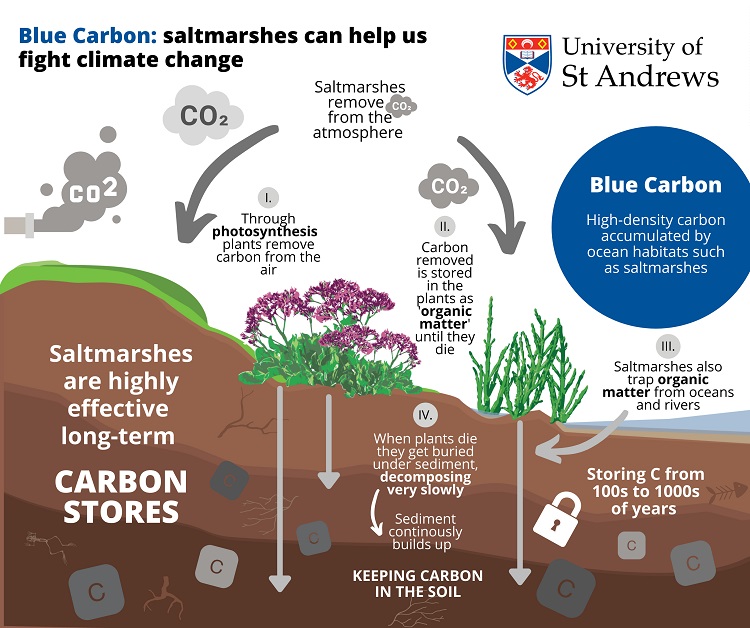Can nature help us tackle the climate emergency?
What role do nature-based solutions have in the fight against climate change? Meet the scientists from the University of St Andrews as part of the Royal Society’s Summer Science 2021 who are researching how coastal landscapes and saltmarshes are key to tackling the global climate emergency.
St Andrews researchers will join top UK scientists for the Royal Society’s Summer Science 2021 digital programme which starts tomorrow (Thursday 8 July). Summer Science 2021 brings together some of the UK’s most exciting researchers for four inspiring days of cutting-edge science, online workshops, lectures and at-home activities, all completely free.
The St Andrews led digital exhibition Blue carbon and changing seas, which involves partners from the UK Centre for Ecology & Hydrology, University of Bangor, University of Leeds and the University of York, will explore the role of carbon capture in coastal wetlands. The interactive exhibition will give the public a unique opportunity to discover how carbon capture and storage solutions provided by nature are essential in mitigating and adapting to climate change in the coming years.
Led by Professor Bill Austin, from the School of Geography and Sustainable Development at the University of St Andrews, Blue carbon and changing seas, will allow the public to get to the root of the role of carbon in the Earth’s climate, create their own experiments at home and understand how small changes to coastal conservation can have a positive global environmental impact.
Professor Austin said: “Coastal wetlands are the most threatened habitats on our planet, threatened by centuries of coastal development and now, increasingly, by rising sea levels and coastal erosion. Blue carbon, which refers to the carbon stored in marine habitats such as saltmarshes, plays a vital role in trapping and storing atmospheric carbon dioxide (CO2) that would otherwise contribute to global warming. Our research highlights how nature-based solutions can help us tackle climate change, while helping to protect, restore and even create new coastal wetlands.”

Summer Science 2021 will bring together the country’s cutting-edge research to life through games, quizzes and interactive activities. It will also offer plenty of chances to meet the scientists and research groups, who are the stars of Summer Science, through interactive workshops and demonstrations.
Cosmologist Professor Carlos Frenk, Chair of the Royal Society’s public engagement committee, said: “We are thrilled to be able to share the brilliant work and exciting discoveries of our 2021 research groups.
“These are scientists involved in cutting-edge research projects, from working on the ExoMars rover, to building machines that can read the mind.
“Summer Science has been reinvented many times since the first Royal Society Conversaziones began in the 18th century, but it will always be a place for innovative researchers to showcase exciting discoveries in an entertaining and accessible way.
“While we can’t wait to welcome guests back in person at the Society’s historic building, we are now able to digitally reach thousands of people around the world who may never have been able to visit the exhibition before. I really hope you will all join us.”
Try the Summer Science activities online at Blue carbon and changing seas and hear more about blue carbon, saltmarshes and how to create your own teabag science experiments.
Infographics available online:
- How do saltmarshes compare to forests infographic
- Teabag science infographic
- Threats to blue carbon infographic
More information on all exhibitions for Summer Science 2021 is available on the Royal Society website.
History of Summer Science
Every year in July for more than three decades, the Royal Society has opened the doors to its building in central London and welcomed thousands of visitors to meet the researchers behind some of the leading science in the UK.
Its history dates back to 1778 when the President at the time, Joseph Banks, started ‘conversaziones’ (later known as the Soirees). An opportunity for Fellows of the Royal Society to show their latest research and breakthroughs, they have since developed into the annual public Summer Science Exhibition.
Issued by the University of St Andrews Communications Office.